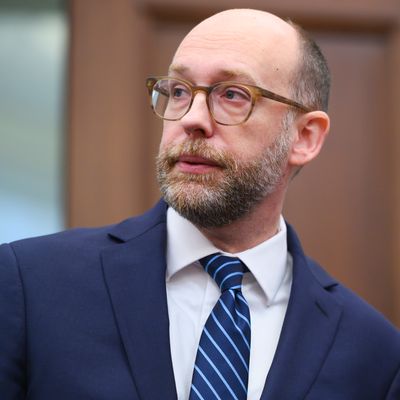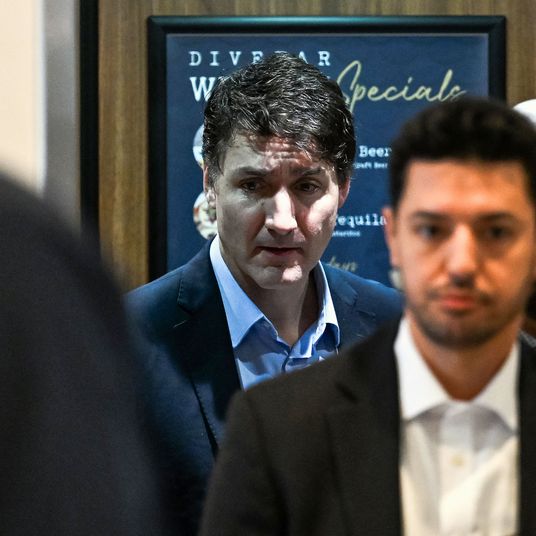
During his 2024 presidential campaign, Donald Trump and aides repeatedly dismissed the idea of any association between them and Project 2025, the Heritage Foundation effort to draft a transition plan and detailed policy blueprint for Trump to use should he win the election. At least 140 members of the first Trump administration helped with the plan, and multiple former Trump Cabinet members wrote much of Project 2025’s 922-page Mandate for Leadership manifesto — including top Trump adviser Russell Vought — but the whole thing became an election-year liability when Democrats began associating the Trump campaign with the extreme policies Project 2025 proposed. Now that Trump and Team MAGA are headed back to the White House, they clearly aren’t keeping their distance anymore. Trump has named several Project 2025 authors and contributors to his White House Cabinet, and despite the fact that Trump transition co-chair Howard Lutnick vowed in September that “I won’t take a list from them,” transition officials are reportedly consulting Project 2025’s personnel database in search of staff to hire.
Below is an updating list of everyone with ties to Project 2025 who is currently set to serve in the second Trump administration.
.
Brendan Carr, FCC chair
Trump has named Brendan Carr, the senior Republican on the Federal Communications Commission, as the next FCC chair. Carr authored the FCC chapter of Project 2025’s Mandate for Leadership, which argues the agency should prioritize “reining in Big Tech, promoting national security, unleashing economic prosperity, and ensuring FCC accountability and good governance.” Among a number of proposals, the chapter proposes eliminating the immunity big tech firms have for third-party content hosted on their platforms under Section 230, and targeting them over alleged censorship. It also calls for adopting a more hawkish FCC approach to foreign adversaries, such as China, like banning TikTok on national-security grounds. And Carr writes that the FCC should make it easier for Elon Musk’s Starlink and other space companies to launch more communication satellites.
.
Pete Hoekstra, U.S. ambassador to Canada
Pete Hoekstra is former representative and current Michigan Republican Party chairman who served as U.S. ambassador to the Netherlands during the first Trump administration. Trump has nominated him to be the next U.S. ambassador to Canada. Hoekstra is listed as a contributor to Project 2025’s Mandate for Leadership. It’s not clear how he contributed, but the Department of Education chapter cites a critical report he authored in Congress on the Department. In 2011, Hoekstra was also named a visiting distinguished fellow with the Heritage Foundation where he focused on education reform.
.
Tom Homan, White House “border czar”
Tom Homan was the acting director of the U.S. Immigration and Customs Enforcement (ICE) during the first Trump administration, in which he was one of the key players implementing Trump’s family-separation policy and other hard-line anti-immigration measures. Homan stepped down in 2018 after his nomination to become ICE director stalled in the Senate, and this time around, Trump has named him his “border czar” — a new role Trump created that does not require Senate confirmation.
Homan is one of the many people listed as contributors to Project 2025’s Mandate for Leadership, but it’s not clear how he contributed. The proposal’s Homeland Security chapter calls for a number of dramatic reforms, including pushing for legislation to dismantle DHS and to carve out and combine all immigration-, customs-, and border-security-related federal agencies “into a stand-alone border and immigration agency at the Cabinet level.” Among a number of hard-line border-security and anti-immigration policy proposals, it also calls for legislation to fund the addition of 20,000 ICE agents as well as expand ICE’s detention capabilities.
.
Karoline Leavitt, White House press secretary
Karoline Leavitt was an assistant press secretary in the first Trump White House, then national press secretary for Trump’s 2024 presidential campaign, and will be White House press secretary to start off Trump 2.0. Though the 27-year-old’s résumé will be among the shortest in the administration, she, too, has ties to Project 2025.
In August, ProPublica and Documented reported on a series of previously unpublished videos from Project 2025’s Presidential Administration Academy, instructional clips intended to train potential future members of an incoming conservative administration. Leavitt appears in a 30-minute video entitled “The Art of Professionalism.”
As a spokesperson for the Trump campaign, Leavitt frequently fielded questions on Project 2025 and consistently tried to distance Trump and the campaign from the controversial initiative. “Project 2025 is not related to our campaign and does not reflect official campaign policy,” she said earlier this year.
.
Stephen Miller, deputy chief of staff for policy
Stephen Miller, the architect of some of the first Trump administration’s most extreme anti-immigration policies — including the Muslim travel ban and the forced separation of migrant families who crossed the southern border — will next be Trump’s deputy chief of staff for policy and homeland security adviser. In between administrations, Miller founded and led the conservative nonprofit America First Legal, which both planned policy for a future Trump administration and filed numerous lawsuits in support of right-wing causes. AFL is one of the organizations that initially advised Project 2025, and Miller appeared in a video promoting Project 2025’s Presidential Administration Academy. After Project 2025 attracted negative publicity earlier this year, Miller distanced himself from the initiative and had AFL removed from the list of Project 2025 advisory groups. After Trump nominated Russell Vought, one of the Project 2025 architects, to return as OMB director, Miller praised Vought as “the guy for the last four years who’s been developing the plan to take down the deep state.”
.
John Ratcliffe, CIA director
John Ratcliffe is a former representative who served as Director of National Intelligence in the first Trump White House, and Trump has nominated him to be the director of the Central Intelligence Agency in his second administration. Ratcliffe is listed as contributor to Project 2025’s Mandate for Leadership, and a 2022 interview with him was listed as a source in the blueprint’s Intelligence Community chapter. That section was written by Dustin J. Carmack, who twice served as Ratcliffe’s chief of staff, in the Office of the Director of National Intelligence, and beforehand in Ratcliffe’s congressional office.
.
J.D. Vance, vice-president
Throughout the campaign, Vance attempted to distance the ticket from Project 2025, but the vice-president-elect is a prominent ally of the Heritage Foundation and a longtime friend and collaborator with foundation president and Project 2025 architect Kevin D. Roberts. Vance wrote the foreword for Roberts’s upcoming book, Dawn’s Early Light: Taking Back Washington to Save America. In the foreword, Vance has nothing but praise for Roberts and the Heritage Foundation, calling the think tank “the most influential engine of ideas for Republicans from Ronald Reagan to Donald Trump”:
As Kevin Roberts writes, “It’s fine to take a laissez-faire approach when you are in the safety of the sunshine. But when the twilight descends and you hear the wolves, you’ve got to circle the wagons and load the muskets.” We are now all realizing that it’s time to circle the wagons and load the muskets. In the fights that lay ahead, these ideas are an essential weapon.
In October, a Vance spokesperson insisted that the foreword “has nothing to do with Project 2025,” and Vance has said that “there are some good ideas” in the proposal as well as “some things I disagree with.”
Vance additionally has ties to Project 2025 co-author Oren Cass and project contributor Elbridge Colby. He also wrote the introduction for a 2017 report from the Heritage Foundation that put forward an expansive policy agenda to restrict sexual and reproductive freedoms.
.
Russell Vought, Office of Management and Budget director
Trump has nominated Russell Vought to return the role he held in the first Trump administration, director of the White House Office of Management and Budget. Vought is one of the architects of Project 2025, and he wrote the Mandate for Leadership’s Executive Office chapter, which proposes a sweeping transformation of the federal bureaucracy to eliminate the independence of federal agencies and consolidate and expand the president’s executive power. The introduction of the chapter has a revolutionary tone, explaining that “The overall situation” of the executive branch “is constitutionally dire, unsustainably expensive, and in urgent need of repair. Nothing less than the survival of self-governance in America is at stake.”
Vought believes that Trump can and must quickly seize an unprecedented amount of power in order to achieve his goals, and he has called for pushing legal boundaries and even reinterpreting the Constitution to facilitate that. Vought also envisions OMB (and thus himself) playing a central role in that effort, arguing that OMB should be an enforcer for the president in all White House policy processes and help bend the federal bureaucracy to the president’s will, no matter what.
Vought is a proponent of slashing, impounding, or reallocating government spending without congressional approval, as well as firing scores of career government employees and replacing them with political appointees. The think tank Vought founded, Center for Renewing America, has put out numerous proposals recommending authoritarian presidential power grabs, including using recess appointments to avoid congressional oversight, ending the Department of Justice’s tradition of political independence, and deploying the military to quell social unrest on U.S. soil. The think tank is also one of Project 2025’s advisory groups.
This post has been updated.
More politics
- Who Is Lara Trump and What’s With the Quashed Senate Rumors?
- The Republican Party Is Out of Control
- Congress Averts Government Shutdown: How It Happened





























